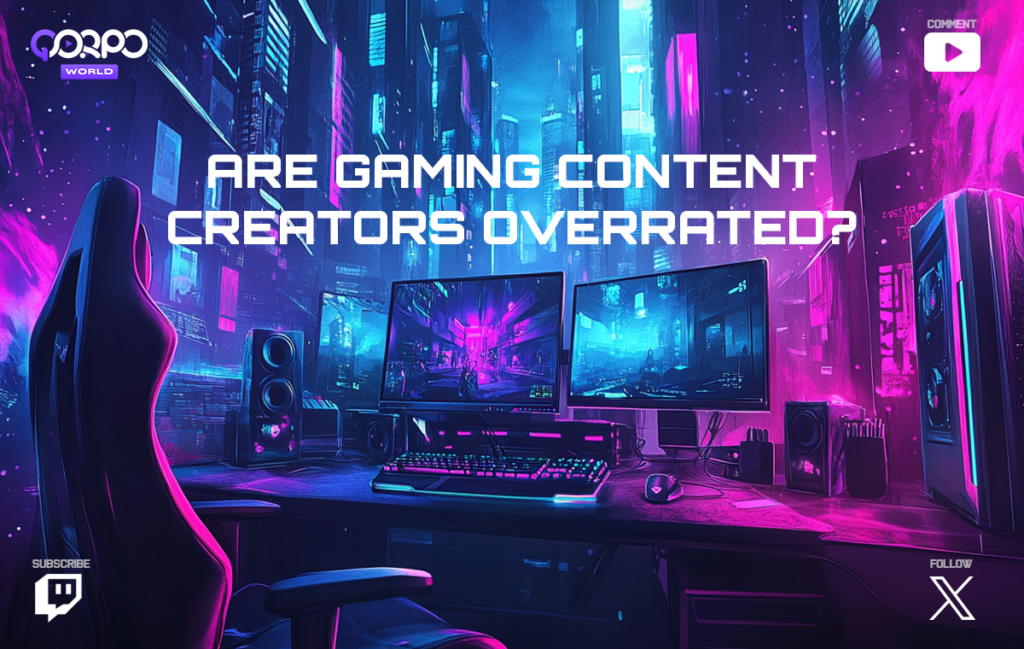
“Gaming content creators are just glorified gamers who get paid to play video games.”
This sentiment has sparked countless debates, whether in Reddit threads or gaming forums. Many gamers feel that content creators have too much influence over game trends.
Is it fair that a single streamer’s opinion can make or break a game’s success? Some argue gaming content creators are glorified marketers, overrated, and overpaid.
Others believe they’re the lifeblood of today’s gaming ecosystem. Essential for driving engagement and keeping communities alive. But how do we separate the hype from the truth?
Over the past months. We’ve seen an unprecedented surge in the popularity of gaming content creators. Platforms like X, Twitch, YouTube, and TikTok have given gamers a stage. Where their skills, personalities, and commentary can be showcased to millions.
With these platforms, the gaming world is currently seeing a transition. From central publications like Retro Gamer, PC Gamer, and C&VG. To PewDiePie, Hbomberguy, and Brycnet amongst others.
With the rise of Web3 games and gaming generally. Creators have found themselves at the forefront of the gaming revolution. Especially in Web3, where player ownership and community engagement are big factors.
But how are content creators pioneering Web3 gaming?
Gaming Content Creators and Web3 Gaming
Gaming content creators have a unique ability to amplify the visibility of both new game releases and classic titles. Their reviews, live streams, and gameplay videos offer potential players a sneak peek into games they might have overlooked. The Newzoo Global Gamers Study showed that:
66% of gamers discovered new games through content creators.
But this begs the question. Are gaming content creators turning into marketing tools rather than contributing any real value to the gaming ecosystem? Take Brycent, for instance. He’s been championing web3 games like Axie Infinity and other web3 games. He’s a gamer who’s not playing games but educating his audience on play-to-earn models and gaming NFTs.
Many other gamers like him have built a large following on social media platforms. Openly playing and showcasing their gaming skills using gaming content that gamers love to watch and learn from. But it’s not all sunshine and rainbows. When big names like Pokimane or Ninja critique a game, developers listen. Take “Fortnite.” Epic Games changed game mechanics based on streamer feedback.
And this is not with traditional games. Axie Infinity, one of the most popular Web3 games, faced significant criticism in 2022 regarding its play-to-earn model and in-game economy. In response to feedback from gamers and creators. The developers at Sky Mavis introduced Axie Infinity: Origins. This made the game more accessible and enjoyable for players who weren’t focused on earning, amongst other changes.
By being vocal and expressive in their unique ways and leveraging their platforms. Gaming creators are pioneering web3 gaming to a whole new level. But, one of the biggest criticisms of the gaming content creator ecosystem is the quality of the content. And also the kinds of opinions they share.
Not every creator delivers top-tier, thoughtful commentary on the games they share. And this leads to criticisms.
Criticisms and Challenges of web3 Gaming creators
Web3 gaming creators face many of the same criticisms as their traditional counterparts. But with some unique twists due to the nascent nature of Web 3. As web3 gaming continues to build a stronger footing. Content creators play a crucial role in bridging the gap between developers and players. Yet they also face significant hurdles.
Quality vs. Quantity
One challenge for web3 gaming creators is the balance between quality and quantity. With the industry growing at a fast rate. There’s a pressing need for content to educate and engage potential audiences. Yet, the rush to produce this content can sometimes lead to a reduced quality. Creators may feel pressured to churn out content. This could compromise depth and accuracy. And most importantly, they risk coming off as being salesy.
Maintaining Objectivity
As with traditional gaming, Web3 content creators often face scrutiny about their objectivity. The speculative nature of many Web3 gaming projects adds an extra layer of complexity. Creators may be accused of promoting games for financial gain. Especially if they hold tokens or NFTs related to the games they cover. Maintaining credibility while navigating these potential conflicts of interest is a delicate balance.
Impact on Gaming Experience
Content creators significantly influence the gaming experience. Over-reliance on guides by gamers can impact the gameplay experience. This could diminish the sense of discovery and personal achievement for players. And it’s particularly relevant in Web3 gaming. Where economic incentives often play a larger role.
However, while web3 gaming content creators face unique challenges. They also have the opportunity to shape the narrative of Web3 gaming. By focusing on producing high-quality content that educates and engages gamers. These creators can play a pivotal role in the growth and maturation of web3 gaming
Creators are Not Marketers: They are Gamers Like You.
Ultimately, while there are legitimate concerns about the credibility of content creators, Their influence in driving engagement and shaping modern gaming culture cannot be denied. Their passion for games and deep understanding of the industry set them apart. As Greg Selkoe, CEO of XSET, aptly puts it,
“If you don’t let the creators be themselves and authentically support them, the message falls flat and doesn’t effectively market the brand or product to the creator’s audience in a way that feels organic.”.
This authenticity is what resonates with gamers and builds trust. Gaming content creators are first, gamers.

